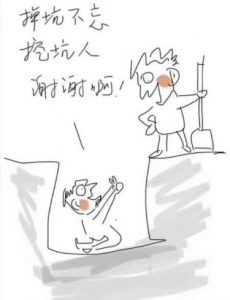Viral Content is a new CDT series introducing terms coined and used by Chinese netizens during the 2019-2020 COVID-19 outbreak. These terms include both subversive critiques of government policies and nationalistic support of them. Similar terms are being compiled and translated at China Digital Space, CDT’s bilingual wiki, as we expand it beyond the Grass-Mud Horse Lexicon to include short biographies of people pushing for change in China, topical resource pages, and special projects.
Gratitude

“Thanks for digging my grave, man!” (Source: CDS)
gǎn’ēn 感恩
At a video meeting of the Novel Coronavirus Epidemic Prevention and Control Command on the evening of March 6, newly stationed Hubei Provincial Party Standing Committee member and Wuhan Party Secretary Wang Zhonglin touted “gratitude education” for the people of Wuhan. At that time, the city had been under lockdown for 43 days and had seen 49,871 confirmed cases and 2,349 deaths.
We must undertake gratitude education throughout the city, so that the populace is grateful to the General Secretary and to the Communist Party, listens to the Party, follows the Party, and forms strong positive energy… The people of Wuhan are heroic people. They are also people who know how to be grateful. [Chinese]
Many in Wuhan were infuriated to hear that they were supposed to be “grateful” for the government’s gross mismanagement of the outbreak, from suppressing warnings from doctors who identified the first cases to heavy-handed lockdowns, like the one in Hubei that effectively quarantined over 50 million people:
@G***周: What can I say? I’m grateful I haven’t been killed, I guess
@小***2: Thank you, Master, for your extraordinary kindness
@m***g: Grateful, I’m not so sure, but I do wish the best for eight generations of your ancestors
@卧***w: even the destruction is a blessing [Chinese]
The backlash forced Wuhan’s official newspaper to withdraw coverage of Wang’s remarks.







